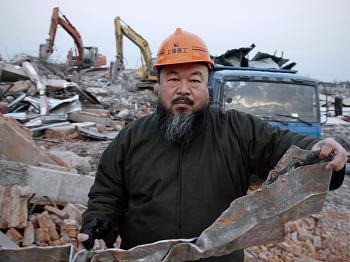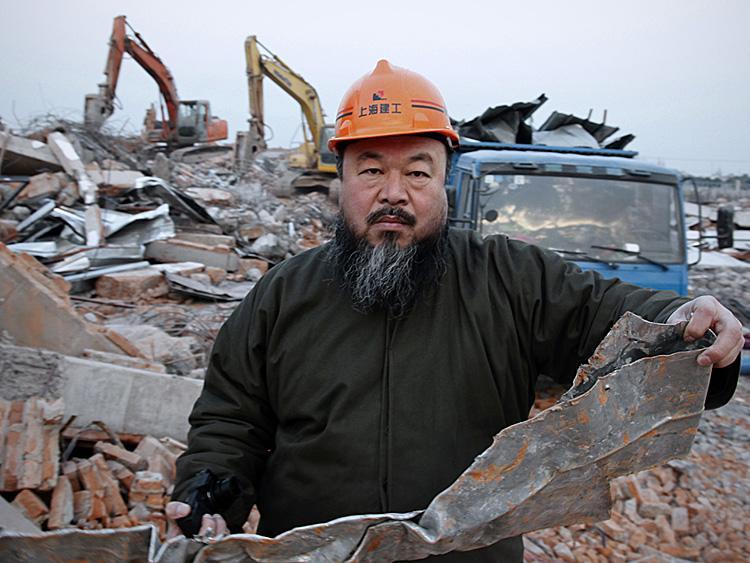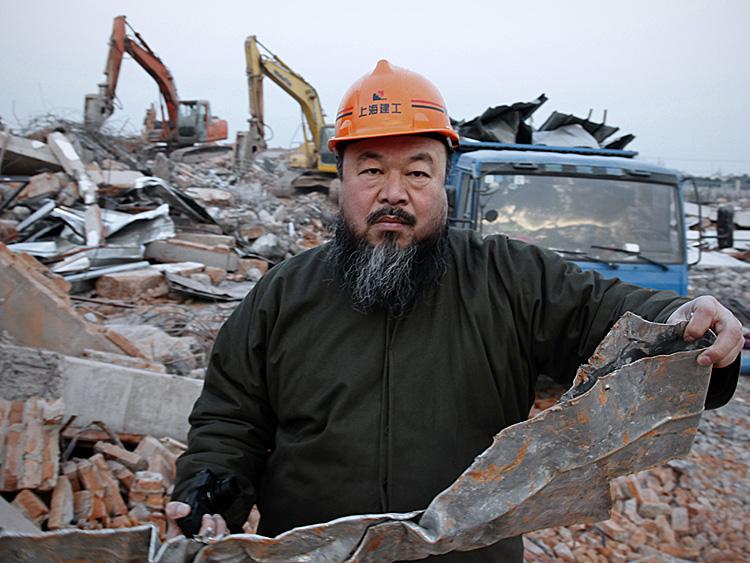The famous and openly subversive Chinese artist Ai Weiwei was intercepted by police at the Beijing International Airport Sunday morning. His studio was raided and assistants arrested, and all their whereabouts are now unknown.
The news broke in a Tweet sent by one of his assistants, saying that Ai was separated from his assistant at the airport and “taken away by two border security officers.” His phone was turned off, the message said.
Ai was on his way to Hong Kong.
Soon after, two dozen public security officers, with a search warrant, entered his studio in Beijing and took away eight helpers. Later in the afternoon, his key aide, Wen Tao, was taken away in an unmarked, heavily tinted car, reports said.
Most of the news was transmitted through the Twitter accounts of Ai’s confidants, who also took phone calls from Western journalists working in China.
Ai is a contemporary visual artist. Much of his artwork reflected his political struggle against the Chinese Communist Party, and for the rights of Chinese people seeking justice. He was also the art behind the creation of the Beijing Olympics “Bird’s Nest” Stadium.
Some observers commented that the apparent coordination involved in the interception and raid indicates that it may have been a premeditated, top-down directive, rather than a local matter, which has imperiled the artist before.
In January this year, Ai’s newly built Shanghai studio was buldozed by authorities without warning.
In August 2009 in Chengdu, the capital of Sichuan Province, Ai was beaten by local police in his hotel room. Four weeks later in Germany he had to be rushed to hospital for a brain hemorrhage caused by the beating.
In Sichuan, Ai had worked on compiling a list of names of every child who had died in the May 2008 earthquake. The children had been trapped in poorly-constructed school buildings—called “tofu-dregs buildings” by Chinese—that collapsed as soon as the quake struck. It was widely believed that funds for construction had been embezzled, resulting in the mass student death.
New York-based AW Asia is scheduled to host Ai’s exhibition “Zodiac Heads” in New York in May. “We are deeply concerned about his safety. We are all outraged by this disgraceful behavior, and that this can happen in a city full of Armani and Porsches,” wrote Larry Warsh, the organization’s founder, via email.
The exhibition will go ahead as planned, Warsh said. “It’s very tragic that the Chinese government doesn’t understand that Ai Weiwei is one of their greatest treasures.”
[email protected]
The news broke in a Tweet sent by one of his assistants, saying that Ai was separated from his assistant at the airport and “taken away by two border security officers.” His phone was turned off, the message said.
Ai was on his way to Hong Kong.
Soon after, two dozen public security officers, with a search warrant, entered his studio in Beijing and took away eight helpers. Later in the afternoon, his key aide, Wen Tao, was taken away in an unmarked, heavily tinted car, reports said.
Most of the news was transmitted through the Twitter accounts of Ai’s confidants, who also took phone calls from Western journalists working in China.
Ai is a contemporary visual artist. Much of his artwork reflected his political struggle against the Chinese Communist Party, and for the rights of Chinese people seeking justice. He was also the art behind the creation of the Beijing Olympics “Bird’s Nest” Stadium.
Some observers commented that the apparent coordination involved in the interception and raid indicates that it may have been a premeditated, top-down directive, rather than a local matter, which has imperiled the artist before.
In January this year, Ai’s newly built Shanghai studio was buldozed by authorities without warning.
In August 2009 in Chengdu, the capital of Sichuan Province, Ai was beaten by local police in his hotel room. Four weeks later in Germany he had to be rushed to hospital for a brain hemorrhage caused by the beating.
In Sichuan, Ai had worked on compiling a list of names of every child who had died in the May 2008 earthquake. The children had been trapped in poorly-constructed school buildings—called “tofu-dregs buildings” by Chinese—that collapsed as soon as the quake struck. It was widely believed that funds for construction had been embezzled, resulting in the mass student death.
New York-based AW Asia is scheduled to host Ai’s exhibition “Zodiac Heads” in New York in May. “We are deeply concerned about his safety. We are all outraged by this disgraceful behavior, and that this can happen in a city full of Armani and Porsches,” wrote Larry Warsh, the organization’s founder, via email.
The exhibition will go ahead as planned, Warsh said. “It’s very tragic that the Chinese government doesn’t understand that Ai Weiwei is one of their greatest treasures.”
[email protected]







